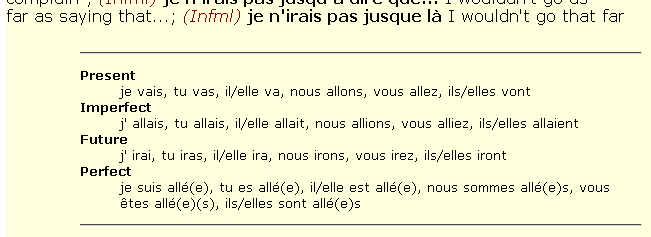|
|
How do you say going in French?On this page, we'll look at how to translate into French sentences such as I'm going to France, he's going to work etc. But what we say will apply to other sentences as well. In English, it's common to use the words am, are, is etc with a word ending in -ing. For example: am working, are waiting is going. To translate these into French, the first step is generally to remove the -ing, so that we're left with the "basic" word: work, wait, go. Then, we look up this basic form in our dictionary. Looking up go in the English-French dictionary on this site, for example, gives an entry looking as follows: 
As in many cases, the whole entry is split into several sections. Each section gives translations and examples of a particular use of the verb go. For now, we'll concentrate on the first part, marked (a), which gives the most general use. The basic translation of go as indicated in the dictionary entry is the word aller. Now, just as the English word go changes its form (going, gone etc), so does the French word aller. So we need to find out which particular form of the word aller we need for our particular sentence. To find out about the different forms of the French word aller, we switch to the French-English side of the dictionary and look up aller. We see that there are two versions of the French word aller: one that means "outward journey" (which isn't the one we want here), but another that, reassuringly, means "to go". Under this part of the entry, we find a section between horizontal lines that looks as follows: 
This is the section that's going to tell us which particular form of the word aller we need. To make a sentence meaning I'm going, he's going etc that talk about a "present" action (or in fact, an action that's about to happen), we need the forms under the heading marked Present. These forms are always listed in a particular order, according to the subject (the "person carrying out the action"). In French, the common subjects are:
je = I
tu = you (talking to a single friend) il = he elle = she nous = we vous = you (multiple people or speaking to somebody who's not a friend) ils = they (males or a mixture of male/female) elles = they (females) So, for example, to say I'm going, we read off the form listed with je; to say you're going, if speaking to a friend, we read off the form listed with tu. To say he's going and she's going, we see that the French form is essentially the same, but we need to choose between il or elle:
Where are we going...?To make je vais..., tu vas... etc into a complete sentnce, we need to add a phrase to say where the person in question is going (in the words of the dictionary entry, the "destination"). The dictionary entry actually includes some examples of how to do this, but we'll look in more detail at how to do this. Essentially, we have two problems:
Which word we use for "to" depends on the type of place (name of a town/city, name of a country, name of a place where an activity is carried out such as a bank, shop etc). going to a town/cityThis is often the easiest case. The French word for "to" is almost always à when followed by the name of a town or city. For example:
je vais à Leeds
I'm going to Leeds elle va à Manchester she's going to Manchester A slight difficulty is that a few towns and cities have French names that are different from English, particularly capital cities:
ils vont à Londres
They're going to London nous allons à Bruxelles We're going to Brussells There are also a few towns that have the word Le "built in" to the start of the name, e.g. Le Havre, Le Mans. In this case, Le may become au (because in general in French, à + le = au): However, this is optional: it is still possible to say e.g. going to a countryBefore a country name, "to" is usually translated as follows:
For example:
1. Mexique (Mexico) is masculine: Il va au Mexique.
|
